21 Important exit interview questions to ask in 2024

One of the bigger challenges faced by employers and HR professionals throughout the year is employee turnover. For the longest time, the factors that led to employee resignations were unknown or weren’t considered important by organizations.
A high employee attrition rate is a red flag for your organization and can lead to increased hiring costs, amongst many other drawbacks. One of the most effective solutions to this problem is exit interviews.
Exit interviews are an integral part of the employee life cycle that is often ignored or not properly executed, leading to unwanted attrition. They are a source of valuable insights that can help reduce turnover and improve employee retention and the overall work culture.
In this article, we will unravel some of the challenges faced during exit interviews and their solutions, along with tips and important exit interview questions that you can steal for your next exit survey!
What is an exit interview?

An exit interview, also known as an exit survey, is simply a concluding meeting between the employee and the human resources representative or the manager taken towards the end of the employee’s time with the organization.
It is a great opportunity for you to understand the reason for the employee’s resignation and provides a deeper look at the work culture, day-to-day processes, and morale from an employee’s point of view.
It is usually conducted face-to-face or indirectly through an online questionnaire using a set of exit interview questions, as using the right set of questions, one can essentially open the door to the mysteries behind high employee turnover in their organization.
Each exit interview question for employees should focus on key areas of importance. A good exit survey comes with set standards and questions that record employee feedback impartially and addresses their concerns and opinions for the betterment of the work environment.
Why is an exit interview important?
Hiring good candidates comes at a price. Moreover, hiring is a time-consuming process. If the candidates stay only for a brief period of time, then you are on your way to going through this process again. Employees can leave for various reasons, including:
- Better job offers.
- Better pay.
- Lack of motivating employee benefits.
- Zero work-life balance.
- Job dissatisfaction.
- Lack of growth opportunities within the organization.
- Conflicts with a co-worker or manager.
If these reasons go unidentified, then you end up with:
- Spending more time and money on hiring.
- Employees leave after a short time with little to no knowledge of the process or organization.
- Poor company reputation if the reason for leaving is because of poor management practices.
In this case, sending a set of exit interview questions provides the employees an opportunity to provide honest, anonymous feedback for creating a suitable work environment for both current and future employees.
The exit interview questions should be aimed at gaining more insights on:
- Employee expectations of the organization.
- Industry benchmarks such as how much your competitors are paying for a similar role (if the employee is leaving your organization for a competitor).
- Feedback on key areas of improvement.
- Team management style and efficiency.
The responses received from the right exit interview questions can be used as a strategy to help boost employee retention and engagement, hire top talent, re-work management practices, and enhance employee productivity and performance.
Reasons for you to conduct employee exit interviews statistics

- HROnboard reports that 71% of organizations lack a formal offboarding process, and 70% of organizations are solely interested in addressing resignations.
- According to research from the Society for Human Resource Management (SHRM), the expense of replacing an employee can range from 50% to 60% of the employee's annual salary.
- In line with Gallup's findings, more than half of departing employees (51%) indicated that in the three months leading up to their departure, neither their manager nor any other leader engaged in discussions regarding their job satisfaction or future within the organization.
- SHRM's data reveals that turnover attributed to cultural factors may have incurred costs of up to $223 billion for organizations over the past five years.
- LinkedIn's research underscores that a significant 94% of employees express a willingness to prolong their tenure with a company if the organization simply invests in aiding their learning and development.
What causes unwanted attrition?

Unwanted attrition can be like a leak in your boat – slow but steady, and if left unattended, it can sink your ship. So, what causes this seemingly unending exodus of talent from your company?
Let's dive deep into this issue and explore some of the key reasons behind unwanted attrition:
- Lack of growth opportunities: One of the primary reasons employees seek greener pastures is the absence of opportunities for personal and professional growth within the company. If your firm doesn't provide avenues for skill development and career advancement, employees may start looking elsewhere.
- Poor work-life balance: In the fast-paced world, it's easy for employees to get burned out. When the scales tip too far in favor of work and there's a lack of balance, employees become disenchanted and may opt for a company that values their well-being.
- Inadequate recognition and rewards: Everyone likes to be recognized for their hard work and contributions. If your company fails to acknowledge and reward its employees, it can lead to frustration and disillusionment, making them receptive to offers from competitors.
- Toxic work culture: Toxic work environments can be incredibly detrimental. If your company fosters an atmosphere of hostility, favoritism, or discrimination, employees will not hesitate to flee to companies with healthier cultures.
- Ineffective leadership: Strong leadership is the backbone of any successful organization. If employees don't trust or respect their leaders, it can create a hostile work environment and push them to seek opportunities elsewhere.
- Compensation disparities: Even with competitive salaries, pay disparities within the organization can cause resentment. If employees perceive unfairness in how compensation is distributed, it can be a significant driver of attrition.
- Lack of communication: Effective communication is crucial for a thriving company. When employees feel disconnected from the company's goals, strategies, or future plans, it can lead to a sense of detachment and, eventually, attrition.
- Absence of work-life integration: With the rise of remote work, maintaining a healthy work-life balance has become more challenging. If your company doesn't support work-life integration and flexible schedules, employees may look for alternatives that do.
Why do companies conduct exit interviews?

Have you ever wondered why companies bother conducting exit interviews when an employee decides to leave? It's a common practice in the business world, and there's a good reason behind it. Let's dive into why these interviews are conducted and why they hold a crucial place in the HR landscape.
- Insight into employee experience: Exit interviews provide an invaluable opportunity to gain insights into an employee's journey within the company. By asking departing employees about their experiences, challenges, and suggestions, organizations can identify patterns and areas for improvement.
- Identify and address issues: These interviews help companies uncover underlying issues that may have contributed to an employee's decision to leave. It could be anything from a toxic work culture to inadequate career growth opportunities. Identifying these issues is the first step towards addressing them.
- Retention strategies: Exit interviews offer a goldmine of information for creating better employee retention strategies. By understanding why employees leave, companies can proactively implement changes to retain top talent in the future. It's like learning from past mistakes to build a brighter future.
- Enhance employee engagement: When employees feel heard and valued, even in their departure, it can leave a positive impression. This can be beneficial for employer branding and may even lead to boomerang employees - those who return to the company in the future.
- Legal and compliance purposes: Conducting exit interviews helps ensure that the company complies with legal requirements. It provides a structured process for employees to voice concerns or complaints, reducing the risk of legal action after their departure.
- Benchmarking and industry insights: Companies can use exit interview data to benchmark themselves against industry standards. This can be a reality check on how they fare in comparison to competitors and can inform strategies to stay competitive in talent acquisition and retention.
- Continuous improvement: Exit interviews align with the principle of continuous improvement. By consistently collecting and analyzing feedback, companies can refine their HR practices, policies, and overall workplace environment. This fosters an atmosphere of evolution and adaptation.
What are the goals of an effective exit interview?

When an employee decides to leave a company, it's not just the end of an employment contract; it's also an opportunity for the organization to gain valuable insights and make improvements. That's where the exit interview comes into play. But what are the goals of an effective exit interview? Let's break it down.
Understanding the departure reason
The primary goal is to understand why the employee has decided to leave. Is it for better career prospects, a toxic work environment, or personal reasons? Identifying the root cause helps the company address specific issues.
Feedback for improvement
Exit interviews aim to collect candid employee feedback about the employee's experience within the company. This feedback is essential for identifying areas that require improvement, whether it's related to company culture, management, or policies.
Retention insights
Companies want to learn what could have been done differently to retain the departing employee. This information can be used to enhance retention strategies and prevent similar departures in the future.
Legal compliance
Exit interviews often serve as a formal process to discuss any outstanding legal or compliance issues. Ensuring all obligations are met helps protect both the employee and the organization.
Identifying patterns
Conducting exit interviews over time can reveal patterns in employee departures. If similar issues keep arising, it's a sign that the organization needs to address systemic problems.
Improving employer brand
A positive exit interview experience can leave a departing employee with a favorable impression of the company, potentially leading to positive word-of-mouth or even the employee returning in the future.
Benchmarking and industry insights
Companies can use the feedback collected in exit interviews to benchmark themselves against industry standards. This enables them to stay competitive in talent acquisition and retention.
HR and policy refinement
Exit interviews help HR departments refine their processes and policies. By listening to departing employees, HR can make necessary adjustments to improve the overall employee experience.
Enhancing workplace culture
Understanding what drove an employee to leave can be a catalyst for improving workplace culture. It allows the organization to address any toxic elements and create a more positive environment for current and future employees.
Continuous improvement
Ultimately, the overarching goal of an effective exit interview is to promote a culture of continuous improvement within the organization. By learning from departures, the company can adapt and evolve, ultimately becoming a better place to work.
How to conduct an exit interview most efficiently?

Even though exit interviews are performed differently in different organizations, there are some steps you can follow to ensure a smooth exit for the employee:
1) Prepare your exit interview questions in advance
Preparing exit interview questions beforehand helps you focus on the information you need from the departing employee. Remember to keep the questions short and to the point.
2) Convey the purpose of the exit interview and how the data will be used
Letting your departing employee know the reasons for the exit interview and how their constructive feedback for the exit interview questions asked, will help them work on similar concerns and challenges for current employees and can prompt them to answer the questions more proactively.
3) Avoid making the exit interview questions too formal
The goal of an exit survey is not to prevent an employee from leaving but to prevent it from happening in the future. A formal conversation between you and the employee may not get you anywhere. The interview, as well as the exit interview questions, must be professional and enable employees to open up and give honest criticisms on their overall experience with the organization.
4) Look out for reasons to retain the employee
Once the employee starts responding to your exit interview questions more freely, you can easily identify the reasons for their leaving. You can try retaining the employee by explaining the actions you can take to solve the challenges faced by the employee in the organization.
Highlighting some of the positive aspects of the organization that can help in the growth of the employee can also prove beneficial in this process.
5) Understand what led them to pursue another job
The primary goal of an exit interview is to identify the reasons that pushed the employee to pursue another job. Thus it is essential to frame the exit interview questions in such a way that it helps you understand the roles and pay your competitors are offering your departing employees.
6) Convey the exit procedure clearly
As a part of the exit interview, your departing employees, too, will have questions for you. In most cases, it could be of the formalities they have to complete before leaving the organization. An exit interview is a good time to convey any pending procedures that must be completed before their last day.
7) Encourage open dialogue
Creating an environment of trust and confidentiality is crucial during the exit interview. Make it clear that their responses will be kept confidential, which can encourage departing employees to be more candid in their feedback. Assure them that the goal is to improve the organization.
8) Be an active listener
During the interview, actively listen to what the departing employee is saying. Avoid interrupting and allow them to express their thoughts fully. This not only shows respect but also ensures you capture valuable insights accurately.
9) Use a mix of question types
In addition to open-ended questions, consider using a mix of question types, including multiple-choice or scaled questions, to gather quantitative data. This can help in analyzing trends and patterns among departing employees' feedback.
10) Follow up on action items
After the exit interview, compile the feedback and identify actionable items for improvement. Share these findings with relevant departments or managers and create a plan to address the issues raised. Following up on these action items demonstrates a commitment to positive change.
Apart from these steps, it is imperative to understand what to avoid in an interview and which exit interview questions can help gain maximum input from the employees. So here are a few do’s and don’ts to keep in mind.
Do's and Don't of running an employee exit survey

Do's
✔ Plan your exit interview and communicate the purpose with the employee in advance.
✔ Keep the exit interview short and simple and only ask relevant exit interview questions
✔ Make detailed notes of the feedback gained from the exit interview questions. This way, the employee feels more validated.
✔ Always end the interview on a positive note.
✔ Encourage departing employees to provide specific examples to support their feedback, allowing for a deeper understanding of their perspective.
✔ Be empathetic and understanding during the exit interview, recognizing that departing employees may have mixed emotions.
✔ Consider conducting anonymous exit surveys for employees who may be uncomfortable sharing their feedback openly.
✔ Use the feedback collected to identify trends and areas for improvement, ultimately benefiting the organization's culture and practices.
Don'ts
✘ Do not force employees to answer any exit interview questions that they do not want to.
✘ Avoid criticizing or making comments on the feedback provided by the employees.
✘ Avoid confusing the employee with too many questions.
✘ Avoid questions that are too personal or unprofessional.
✘ Don't rush through the exit interview process; it's essential to allocate sufficient time for a meaningful conversation.
✘ Don't take negative feedback personally; remember the goal is to gather constructive input for improvement.
✘ Don't promise changes that cannot be implemented, as this can lead to disappointment among remaining employees.
✘ Avoid sharing confidential exit interview feedback with colleagues who do not have a legitimate need to know.
How to use exit interviews to improve employee engagement?

Exit interviews can be used to improve employee engagement by identifying areas where employees are dissatisfied and finding ways to address those concerns.
Additionally, asking the right exit interview questions can be used to identify trends in employee dissatisfaction and to develop strategies to prevent future turnover. The trends and strategies can then be used to boost employee engagement in various ways.
- Make sure that your exit interviews are conducted for all departing employees.
- Ask the right exit interview questions and probe for deeper answers.
- Ask questions that go beyond the superficial and explore the underlying reasons why employees are leaving.
- Be open to employee feedback and be willing to make changes based on what you learn from the employees.
- Use exit employee surveys as an opportunity to improve your organization and make it a more attractive place to work.
- Let your employees know that their feedback is valued and that you are taking action based on what they have to say.
- Ensure that your exit interviews are conducted consistently for all departing employees, regardless of their role or tenure.
- Continuously refine your exit interview questions to elicit meaningful responses. Ask about specific aspects of the work environment, team dynamics, and management to pinpoint areas of concern.
- Go beyond surface-level responses. Encourage departing employees to delve deeper into the underlying reasons behind their departure.
- It's not enough to collect feedback; you must be open to acting on it. Employees are more likely to engage when they see tangible improvements resulting from their input.
- Systematically analyze exit interview data to identify recurring trends and patterns. These trends can highlight systemic issues that need attention to enhance overall engagement.
- Use the insights gained from exit interviews to develop proactive employee engagement strategies.
10 Best practices to adopt for a successful exit interview

An efficiently conducted exit interview can fill you in all the blank spaces regarding where the company stands on the employee front and will help you to understand employee pulse better.
To ensure a successful exit interview, follow these practices for a productive conversation with the employee.
- An exit interview must be unbiased and objective.
- Plan and conduct the exit interview well before the employee leaves.
- Conduct the interview in a private setting.
- Encourage honest feedback.
- Don’t take the feedback personally.
- Keep the information confidential.
- Align the exit interview questions to employee engagement and retention metrics for greater results and actionable insights.
- Develop a standardized process for conducting exit interviews.
- Conduct it after the employee has given notice but before their departure date.
- After the interview, provide a follow-up mechanism for departing employees to express any additional concerns.
What not to ask in an exit interview?

Exit interviews can be valuable tools for organizations to gather feedback and insights from departing employees. However, there are some questions that should be off-limits. So, what NOT to ask in an exit interview?
- Personal or invasive questions: The first cardinal rule is to avoid personal inquiries. Asking about an employee's personal life, relationships, or health is not only irrelevant but can also be seen as invasive and inappropriate.
- Blame-game questions: It's a mistake to put departing employees in a position where they feel compelled to assign blame for their departure. Questions like, "Whose fault is it that you're leaving?" or "Who do you think is responsible for the issues you faced?" can create a confrontational atmosphere and deter honest feedback.
- Leading questions: Avoid crafting questions that suggest a specific answer or opinion. Leading questions can influence responses and prevent you from getting genuine feedback. For example, instead of asking, "You didn't like your manager, did you?" you could ask, "Can you share your experiences working with your manager?"
- Questions about future employers: Inquiring about a departing employee's future job prospects or the name of their new employer may be seen as prying into their personal affairs. Focus on the reasons they're leaving your organization and how you can improve.
- Questions that can be seen as retaliatory: Never ask questions that could be interpreted as seeking retribution or revenge. Questions like, "Do you think you'll be more successful in your new job?" or "Are you sure this is the right decision?" can put employees on the defensive.
- Questions about coworkers: Avoid asking employees to name colleagues they didn't get along with or those they had conflicts with. This can fuel negativity and might not be relevant to the employee's overall experience at the company.
- Salary and compensation questions: Exit interviews are not the time to discuss compensation matters. Questions like, "Did you feel you were paid fairly?" or "Were you satisfied with your salary?" are better suited for discussions during employment.
21 Best exit interview questions for employees

Here are some of the best exit interview questions you can ask your employees, to get deep insights on what can be improved in your company culture to retain employees better:
1) Has the job description changed after you were hired?
Every job comes with additional responsibilities than what was mentioned in the job description. Most of the time, these changes are small and often ignored by managers or employees.
This exit interview question can highlight the changes or responsibilities that the employee undertook and was beyond the job description. You can use this information to update the job description before the next hire.
2) Were you provided the essential tools, resources, and training by your manager or supervisor for the job?
It is common to feel overwhelmed by some tasks, especially if they are new to the job. Managers and supervisors must ensure that employees are equipped with all essential knowledge and resources to carry out their duties without interruption.
In addition, you can also understand what parts of the training provided were particularly helpful and what can be improved.
3) How was the workload for this role?
With time and closing deadlines, employees are usually burdened with extra work. This could be all right to handle for a short time and as long as it doesn’t take over an employee’s personal time.
This exit interview question highlights the balance and imbalance of work and life the employee experiences with the organization.
4) What led you to look for another job?
Now, this question is only relevant when your employee leaves the organization to pursue a role in another one. You can understand why the employee decided to leave the organization, the market pay offered, employee benefits, and other facilities your competitors offer for the role.
5) How has the experience with your co-workers and manager been?
All employees spend a considerable amount of their time during work hours with co-workers and managers. Understanding how the overall working experience was with them, how ideas and feedback were exchanged, and how or whether it has been implemented are some aspects that can be discussed.
6) What was the best part of your journey with us so far?
Different employees will have different answers to this exit interview question. However, there could be a common pattern that you can identify from the answers, such as work-life balance, flexible working hours, competitive salary, employee benefits, and many others.
Make efforts to maintain and improve them as these are the reasons that make an organization a good workplace.
7) How would you describe the work culture here?
A glimpse into the employee's perspective of the work culture highlights the different experiences they have had. You can always use this information to strengthen the work values and ideologies across the organization.
8) Did you feel your compensation was fair?
One of the most common reasons for employee turnover is unfair compensation. Employees feel like they are underpaid for the work they are carrying out or might have taken up the job in the hope of finding a better one later.
This data can be used to ensure fair pay for everyone and stay on top of the market. Furthermore, this exit survey question helps you identify if the organization can match their expectations, you may even be able to retain the employee.
9) How do you think we can improve employee morale?
Employees working in different teams or departments may have their own opinions on improving employee morale and unwanted attrition. Even though implementing all of them might not be possible, some of them can have a greater effect on employee morale.
Pick out the ones you feel will make a difference in the organization and monitor them to understand their impact.
10) What do you think the organization needs improvement at?
Even though this is a common exit interview question, it can prompt employees to give genuine feedback, one they couldn’t or didn’t offer during their time in the organization.
11) Do you think you will return to work with us in the future?
This exit interview question provides insights into the loyalty and engagement of the employee with the organization. A positive answer also means that the employee will have good things to talk about the organization and will likely recommend the company to others.
12) Were there any communication challenges during your time here?
Effective communication is essential in any workplace. This question helps identify if there were any hurdles in communication that affected the employee's performance or overall experience.
13) Did you have opportunities for professional development and growth?
Employee growth and development are critical for job satisfaction. Understanding if the departing employee felt they had opportunities to learn and advance within the organization can reveal areas for improvement.
14) Were you satisfied with the recognition and feedback you received?
Recognition and feedback play a crucial role in employee engagement. This question assesses whether the employee felt acknowledged and appreciated for their contributions.
15) Did you feel your work-life balance was supported?
Work-life balance is a significant factor in employee well-being. Knowing if the departing employee felt their work-life balance was respected can inform policies and practices to improve it.
16) What suggestions do you have for improving the onboarding process?
Gathering input on the onboarding process can lead to a smoother transition for new hires. Departing employees can provide insights into what worked well and what could be enhanced to better prepare new employees for success.
17) Were there any specific challenges or obstacles that hindered your productivity?
Identifying productivity barriers is essential for optimizing workflow and ensuring employees can perform at their best. Understanding these challenges can lead to process improvements.
18) Did you feel that your contributions and ideas were valued and taken seriously?
Employee engagement often hinges on feeling heard and valued. This question helps gauge whether the departing employee's input was respected and considered by the organization.
19) Were there any safety concerns or issues during your tenure?
Safety in the workplace is paramount. This question allows you to address any potential safety concerns or issues that may have arisen during the employee's time with the company.
20) Can you share your thoughts on the company's approach to diversity and inclusion?
Diversity and inclusion are crucial for a healthy workplace culture. Asking for feedback on these aspects can help identify areas where the organization can improve its efforts to create an inclusive environment.
21) How would you rate your overall experience working with us on a scale of 1 to 10?
A simple numerical rating can provide a quick snapshot of the departing employee's overall satisfaction. It allows for easy tracking of trends over time and highlights areas that may require attention.
Don’t wait for the exit interview to ask these questions?
Exit interviews are valuable, no doubt, but they often come too late to address issues that could have been resolved earlier. To foster a healthier work environment and reduce turnover, consider asking these 25 questions throughout an employee's tenure:
- What attracted you to this company in the first place?
- What do you find most fulfilling about your role?
- Are there any aspects of your job that you find particularly challenging?
- Do you feel your skills are being fully utilized in your current role?
- Are you receiving the necessary support and resources to excel in your job?
- How do you perceive the company culture?
- Do you feel comfortable expressing your ideas and concerns to your immediate supervisor?
- Are you satisfied with your work-life balance?
- Do you believe there are clear opportunities for career growth within the organization?
- Have you had any experiences with workplace conflicts or challenges in teamwork?
- Are there any training or skill development opportunities you'd like to see offered?
- Do you feel adequately recognized for your contributions?
- How do you rate the communication within your team and the organization as a whole?
- Have you encountered any obstacles that hinder your productivity?
- Are you aligned with the company's mission and values?
- What would make you more engaged and motivated in your work?
- Have you ever considered leaving the company? If so, what prompted that thought?
- Are there any specific changes you'd like to see in your role or department?
- What aspects of the company's leadership do you find effective?
- Do you have a clear understanding of your role and responsibilities?
- How would you describe your relationship with your colleagues and superiors?
- Are there any company policies or procedures you find particularly frustrating?
- What can the company do to better support your professional and personal well-being?
- Are there any tools or technologies you think would improve your job performance?
- How would you rate your overall job satisfaction on a scale of 1 to 10?
10 Employee exit interview survey tools

When it comes to conducting exit interviews, having the right tools at your disposal can make a world of difference. These interviews are invaluable for understanding why employees leave, identifying areas for improvement, and ultimately boosting employee retention.
So, let's explore ten exit interview tools that can help streamline the process and gather insightful feedback.
1. CultureMonkey
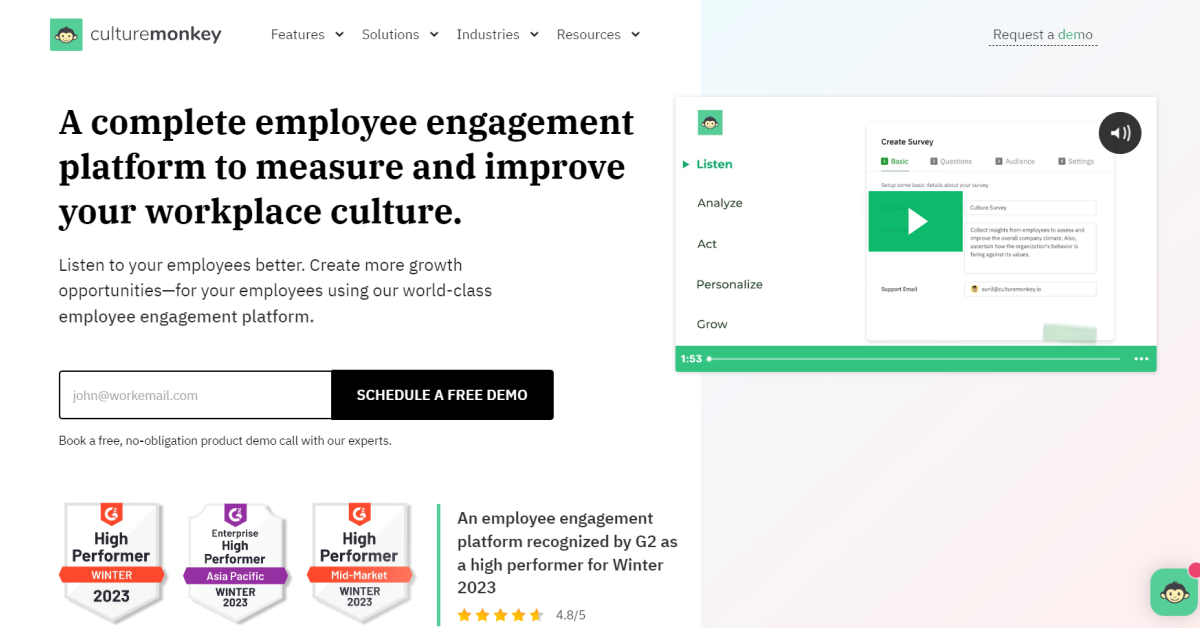
CultureMonkey, an employee engagement survey tool, stands out as one of the premier employee exit interview survey platforms in the market, offering a comprehensive solution to enhance your offboarding process and gather valuable insights from departing employees.
Here's why CultureMonkey is a top choice for organizations looking to conduct effective exit interviews:
Easy steps to launch
Launching employee engagement surveys is a breeze with CultureMonkey. The platform's user-friendly interface guides you through creating a survey from scratch, selecting participants, and swiftly launching the survey. This simplicity ensures that you can start collecting feedback without any hassle.
50+ Employee survey templates
CultureMonkey provides access to a library of over 50 research-backed survey templates, designed to jumpstart your feedback collection process. These templates cover a wide range of topics and drivers, allowing you to create customized surveys that resonate with your employees and address specific concerns.
HRMS integration
Enhance your feedback collection process by integrating CultureMonkey with leading HRMS tools such as Darwinbox, Zoho People, Okta, SAP, Keka, and more. This integration streamlines the survey launch process, provides real-time insights, and empowers you to boost workplace engagement seamlessly.
User-friendly employee surveys
CultureMonkey's surveys are designed with usability in mind. They support multilingual survey questions and are highly mobile-friendly, ensuring that employees can conveniently provide feedback on various devices and even on the go. Integration with popular communication platforms like Slack, Teams, and WhatsApp also increases participation rates.
Anonymous conversations
Transform anonymous employee feedback into meaningful conversations with CultureMonkey. Encourage open and honest dialogues between employees and management, fostering an environment of transparency and trust.
Lifecycle surveys
Capture feedback at every stage of the employee journey with CultureMonkey's lifecycle surveys. This feature helps HR teams gain insights into the factors influencing engagement, from onboarding and training to professional growth and beyond.
Employee feedback quick insights
CultureMonkey's engagement score heat map visually represents employee engagement metrics. The industry benchmark comparison feature allows you to measure your organization's performance against industry standards, helping you identify strengths and weaknesses.
In-depth reporting
Leverage CultureMonkey's customizable survey reports to filter and gather the feedback that matters most to your organization. Analyze critical metrics, including participant count and survey participation rates, to gain a comprehensive understanding of employee sentiments.
Identifies top issues
CultureMonkey utilizes GPT-powered explorer tools to extract key keywords from thousands of employee feedback responses, providing HR teams with a quick overview of critical themes and issues affecting engagement and morale.
Employee feedback sentiment analysis
Automatically classify employee feedback into positive, negative, and neutral sentiments with CultureMonkey's sentiment analysis. Use rich filters to explore sentiments by department, team, or demographic, gaining valuable insights into the drivers of employee engagement.
Manager effectiveness
Assess manager effectiveness through pulse surveys and gather honest feedback. Identify areas for improvement and address attrition trends with personalized engagement actions, helping develop and strengthen your managerial teams.
Actionable insights
Leverage AI-driven analysis to identify key themes and trends in employee feedback. CultureMonkey provides actionable recommendations to improve engagement and address areas of concern promptly, resulting in a more engaged and satisfied workforce.
Learn more about CultureMonkey
2. Qualtrics
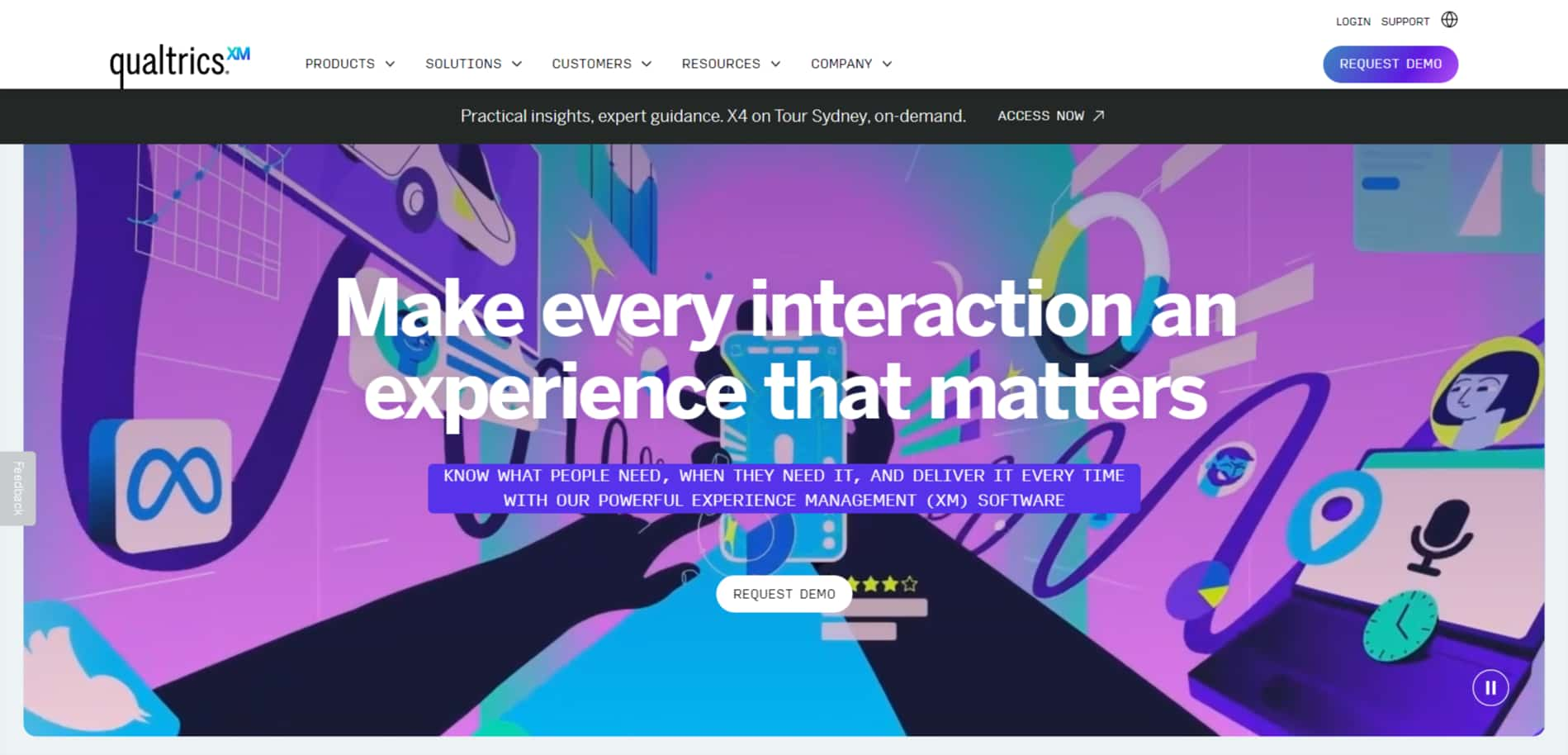
- Exit interview capabilities: Qualtrics EX allows organizations to design and administer exit interviews seamlessly. HR teams can create tailored surveys to gather feedback from departing employees, providing valuable insights into the reasons for leaving and areas for improvement.
- 360-Degree feedback: In addition to exit interviews, Qualtrics EX supports 360-degree feedback surveys. This feature enables organizations to collect input from various stakeholders, including managers, peers, and subordinates, to gain a holistic view of an employee's performance and growth areas.
- Pulse surveys: The platform offers pulse surveys to measure employee sentiment and engagement regularly. This helps organizations identify issues in real-time, address them promptly, and proactively prevent attrition.
- Customizable surveys: Qualtrics EX provides a user-friendly interface for designing surveys. Organizations can customize questions, templates, and survey formats to align with their unique needs and culture.
- Advanced analytics: The platform's analytics capabilities enable organizations to derive actionable insights from survey data. Qualtrics EX offers sophisticated reporting and visualization tools, making it easier for HR professionals and leaders to interpret feedback and make data-driven decisions.
Learn more about Qualtrics
3. SurveySparrow
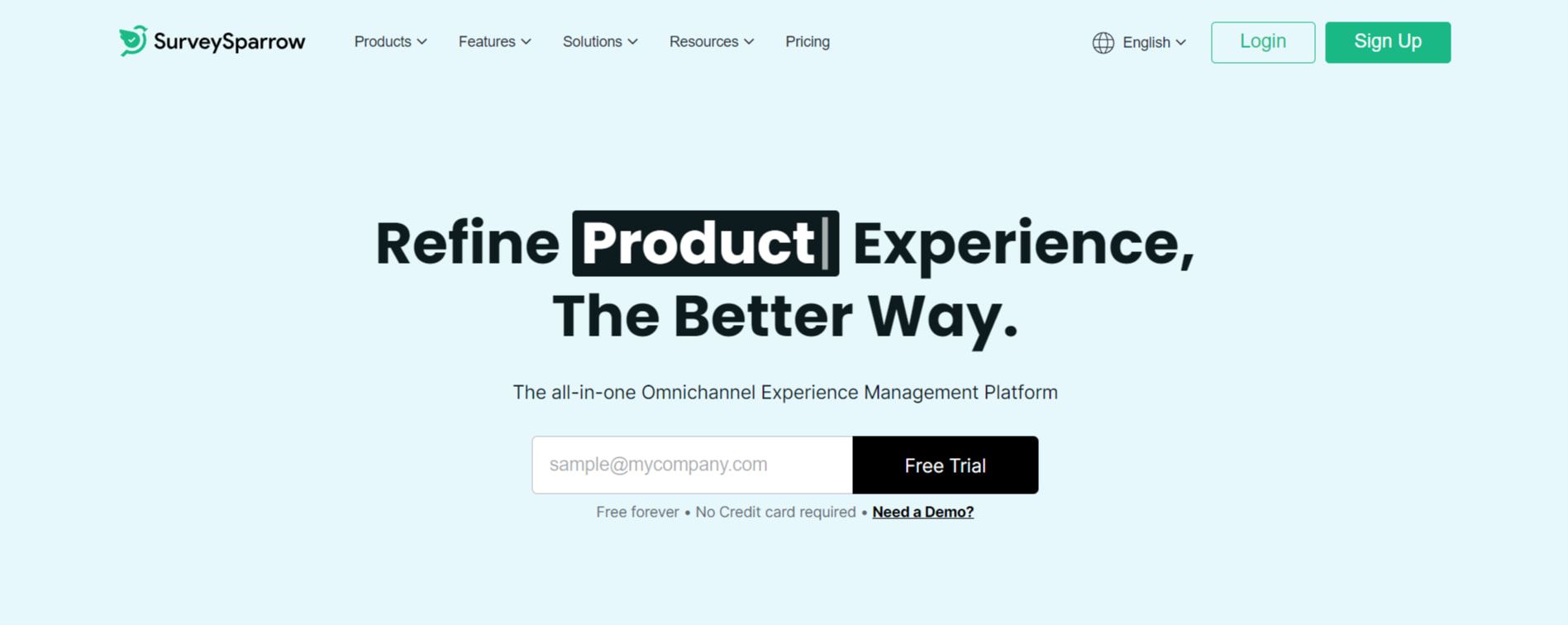
- Customizable surveys: SurveySparrow allows organizations to create highly customized surveys. HR teams can tailor exit interview questions to collect specific feedback from departing employees, gaining insights into their reasons for leaving and areas for improvement.
- Automated surveys: The platform offers automation features, enabling organizations to schedule and send exit surveys automatically when an employee resigns. This ensures a timely and consistent approach to exit interviews.
- Anonymous feedback: SurveySparrow allows employees to provide anonymous feedback during exit interviews, promoting honesty and openness. This anonymity encourages departing employees to share their candid thoughts and experiences.
- Reporting and analytics: The platform provides robust reporting and analytics tools. HR professionals and leaders can analyze exit interview data to identify trends, pinpoint common reasons for turnover, and make data-driven decisions to improve employee retention.
- Integration capabilities: SurveySparrow integrates with various HR systems and tools, allowing organizations to seamlessly incorporate exit interview data into their HR workflows. This integration streamlines the process of gathering and analyzing feedback.
Learn more about SurveySparrow
4. Jotform
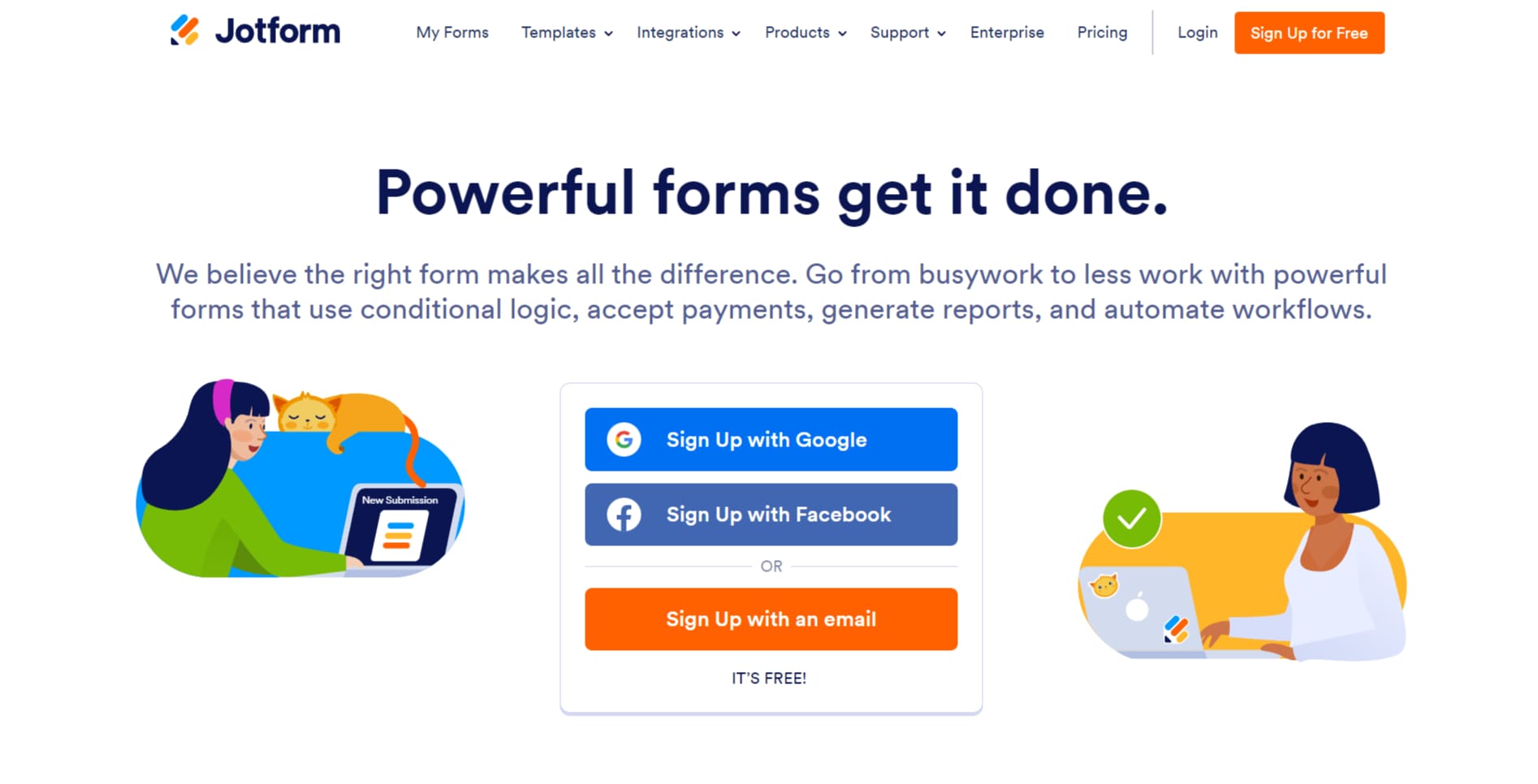
- Customizable surveys: Jotform allows users to create highly customizable surveys and forms. This flexibility means you can design exit interviews tailored to your organization's specific needs.
- Ease of use: Jotform's user-friendly interface makes it accessible to HR professionals without extensive technical skills. You can quickly create, deploy, and share exit surveys.
- Templates: The platform offers a library of survey templates that can be used as a starting point for exit interviews. This saves time in designing surveys from scratch.
- Automated notifications: Jotform provides automation features, allowing you to set up automated notifications and reminders for exit interviews. This ensures that the process stays on track.
- Data management: Jotform offers data management tools, including reporting and analytics features. You can analyze exit interview data to identify trends, common reasons for turnover, and areas for improvement.
Learn more about Jotform
5. Freshworks

- Survey tool integration: Freshworks provides integration capabilities, allowing users to connect with third-party survey tools like SurveyMonkey, Google Forms, or Typeform. This enables organizations to create and distribute exit interview surveys seamlessly.
- Email campaigns: Freshworks offers email marketing features that can be leveraged to send out exit surveys to departing employees. You can schedule and automate email campaigns to gather feedback.
- Automation and workflows: Freshworks' automation and workflow features can be used to trigger exit interviews when an employee resigns. This ensures that the process is initiated promptly.
- Data management: The platform includes reporting and analytics features. Users can analyze exit interview data to identify trends, common reasons for turnover, and areas for improvement within the organization.
- Integration with HR tools: Freshworks integrates with various HR tools and platforms. By connecting it with your HR system, you can streamline the exit interview process and centralize data management.
Learn more about Freshworks
6. Typeform
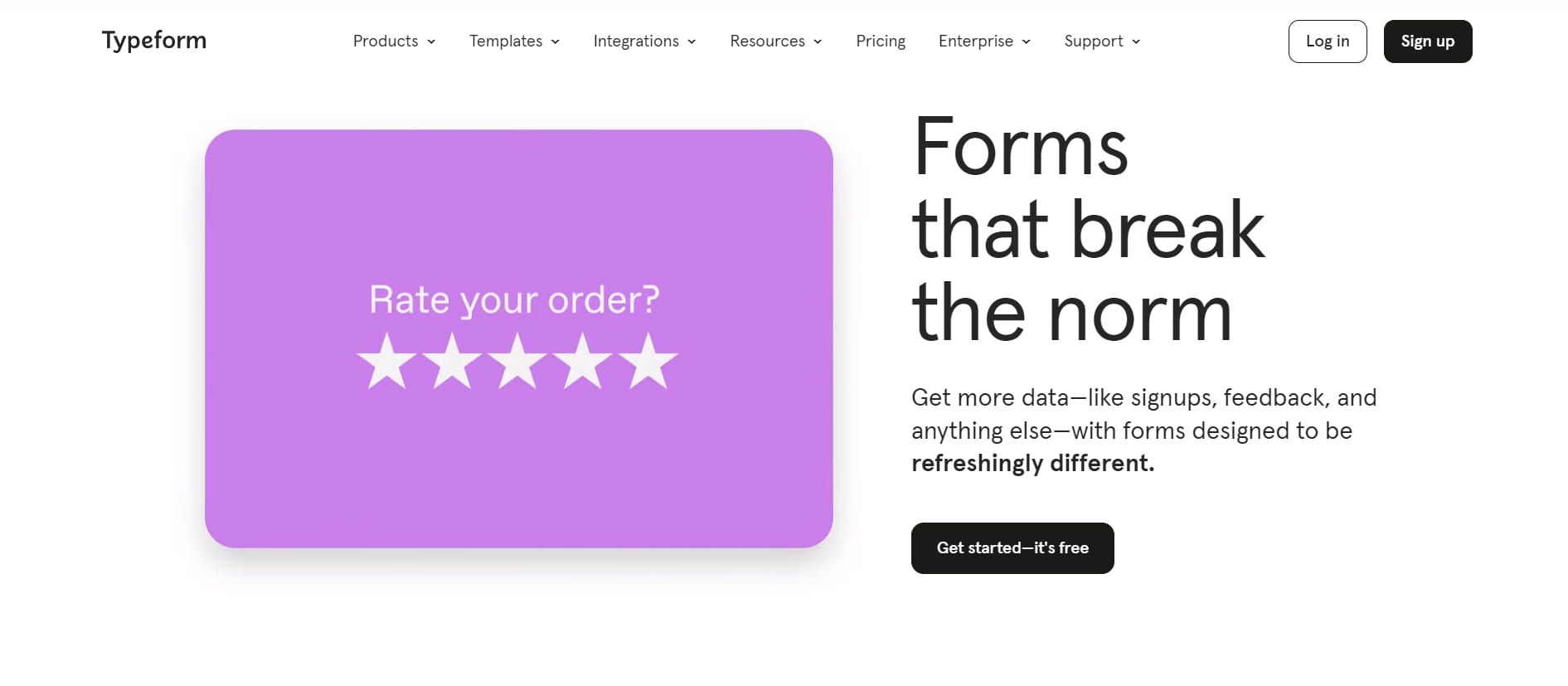
- Customizable surveys: Typeform allows users to create highly customizable surveys and forms. This flexibility means you can design exit interviews tailored to your organization's specific needs, with the ability to include open-ended questions and various question types.
- Ease of use: Typeform's intuitive drag-and-drop interface makes it accessible to HR professionals without extensive technical skills. You can quickly create and deploy exit surveys, ensuring a seamless experience for both HR teams and departing employees.
- Templates: The platform offers a selection of pre-designed survey templates that can serve as a foundation for exit interviews. This can save time in creating surveys from scratch.
- Integration capabilities: Typeform supports integration with various third-party tools and platforms, including HR software and analytics tools. This allows for streamlined data transfer and centralized management of exit interview data.
- Data analysis: Typeform provides reporting and analytics features, enabling HR professionals to analyze exit interview data. You can identify trends, common reasons for turnover, and areas for improvement within the organization.
Learn more about Typeform
7. SmartSurvey

- Customizable surveys: Survey platforms typically allow users to create customized surveys and questionnaires, making it possible to design exit interviews tailored to an organization's needs.
- Reporting and analytics: These platforms often provide reporting and analytics tools to help organizations analyze exit interview data, identify trends, and pinpoint areas for improvement.
- Data security: Survey platforms typically prioritize data security and compliance with data protection regulations, ensuring that sensitive employee feedback is handled securely.
- Automation: Some survey platforms offer automation features that can help streamline the exit interview process by sending out surveys automatically when an employee leaves.
- Integration: Many survey platforms offer integration capabilities, allowing organizations to connect survey data with other HR or analytics tools for a more comprehensive view of employee feedback and attrition trends.
Learn more about SmartSurvey
8. SurveyMonkey

- Ease of use: The platform's user-friendly interface makes it accessible to HR professionals with varying technical expertise. You can swiftly create, distribute, and collect exit surveys, ensuring a seamless experience for both HR teams and departing employees.
- Data analysis: The platform offers robust reporting and analytics features. HR professionals can analyze exit interview data to identify trends, common reasons for turnover, and areas for improvement within the organization.
- Templates: SurveyMonkey provides access to a library of pre-designed survey templates. While not specifically tailored for exit interviews, these templates can serve as a foundation, saving time in creating surveys from scratch.
- Customizable surveys: SurveyMonkey allows users to create highly customizable surveys and questionnaires. This flexibility means you can design exit interviews tailored to your organization's specific requirements, including open-ended questions and various question types.
- Integration capabilities: SurveyMonkey supports integration with various third-party tools and platforms. This allows organizations to streamline data transfer and centralize the management of exit interview data.
Learn more about SurveyMonkey
9. Leapsome
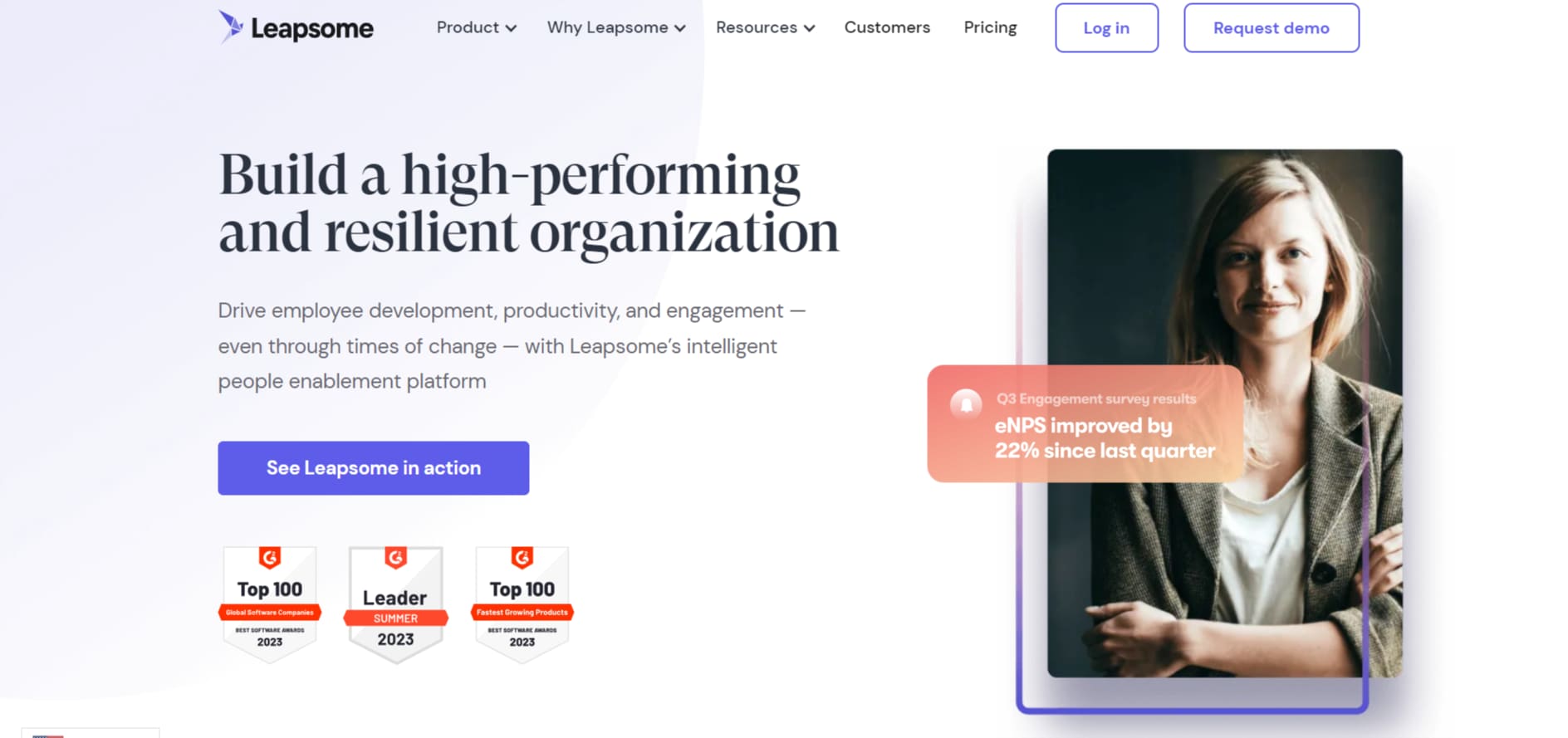
- Customizable surveys: Leapsome, like other employee feedback and engagement platforms, may offer customizable survey features. This allows organizations to create tailored exit interviews with questions specific to their needs.
- Automated surveys: Many HR platforms, including Leapsome, offer automation capabilities. This means you can schedule and automate the distribution of exit surveys when an employee leaves the company, ensuring a timely and consistent process.
- Analytics and reporting: Platforms like Leapsome typically provide robust reporting and analytics tools. HR professionals can analyze exit interview data to identify trends, common reasons for turnover, and areas for improvement.
- Integration: Leapsome may offer integration capabilities with other HR software and tools. This allows organizations to streamline data management and incorporate exit interview data into broader HR analytics and reporting.
- Anonymous feedback: Maintaining anonymity is crucial for honest exit interviews. Leapsome may provide features to ensure that departing employees can provide feedback confidentially, which can encourage them to share their candid thoughts and experiences.
Learn more about Leapsome
10. ContactMonkey
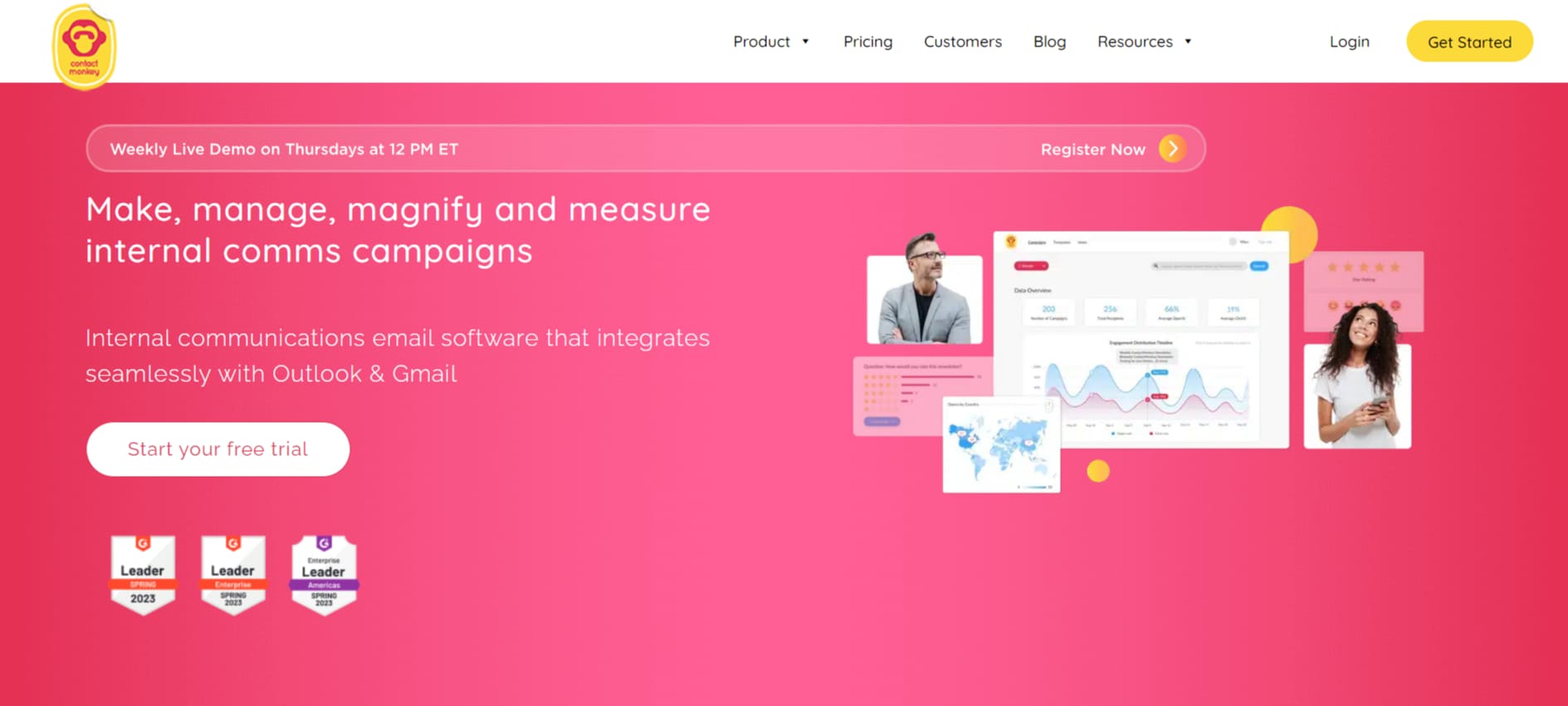
- Email survey integration: ContactMonkey may offer the capability to seamlessly integrate surveys and feedback forms into outgoing emails. This can be particularly useful for sending exit surveys to departing employees via email.
- Response tracking: The platform may provide tracking features that allow organizations to monitor which employees have responded to exit interviews and which have not. This ensures that all departing employees are given the opportunity to provide feedback.
- Customizable surveys: ContactMonkey may offer customizable survey templates or the ability to create bespoke exit interview surveys. This enables organizations to tailor questions to their specific needs.
- Data reporting: Like many survey tools, ContactMonkey may offer reporting and analytics features. HR professionals can analyze exit interview data to identify trends, common reasons for turnover, and areas for improvement.
- Automated follow-ups: The platform might support automated follow-up emails to encourage departing employees to complete exit surveys, ensuring a higher response rate.
Learn more about ContactMonkey
Conclusion
Employee turnaround is just another part of the employee life cycle, and there is nothing much you can do to prevent it completely, but there are definitely ways to reduce it. This is where exit interviews come into play. Use your exit interview questions to understand how, where and what to improve in your organization for better employee retention and engagement.
To make a change or to spot a mistake, you don’t have to wait until one of the employees decides to leave. You can take an employee survey to get deeper insights into the employees and organization and develop strategies to work towards a safer and more competitive work culture.
If you’re looking for more information on survey questions, check out our detailed guide on employee survey questions.
FAQs
What are common exit interview questions?
Common exit interview questions often revolve around the reasons for leaving, job satisfaction, and feedback on the work environment. Some examples include:
- "What prompted your decision to leave the company?"
- "Can you provide feedback on the company culture?"
- "Did you have opportunities for career growth?"
- "What suggestions do you have for improving the workplace?"
How to prepare for an exit interview?
To prepare for an exit interview, reflect on your experiences, be honest, and stay professional. Consider your reasons for leaving and provide constructive feedback. Be ready to discuss your contributions and achievements. Approach the interview with a positive attitude, focusing on your growth and the company's success.
What are good exit interview questions for employers to ask?
Employers should ask questions that help them understand the employee's experience and gather actionable feedback. Examples include:
- "What aspects of your job did you find most fulfilling?"
- "Were there any challenges you encountered during your time here?"
- "Can you suggest improvements to our management or workplace culture?"
- "How do you rate your overall experience working with us?"
How to answer tough exit interview questions?
When facing tough questions, be honest yet diplomatic. Avoid blaming individuals or making it personal. Focus on constructive feedback and suggest potential solutions. For example, if asked about conflicts, discuss the issue professionally and mention efforts to resolve it. Always end on a positive note, emphasizing your appreciation for the experience gained.
How long should an exit interview be?
The duration of an exit interview can vary but typically ranges from 20 minutes to an hour. The ideal length depends on factors like the complexity of the employee's role, the depth of feedback needed, and the company's practices. While it's essential to cover relevant topics thoroughly, it's equally important not to make it excessively long, as it may become burdensome for both parties.
Who conducts an exit interview?
Exit interviews are typically conducted by HR professionals or a designated member of the HR team. However, in some cases, a manager or supervisor may also be involved, especially for higher-level employees. The key is to have someone who can maintain objectivity and confidentiality. This helps create an environment where departing employees feel comfortable sharing honest feedback without fear of repercussions.



